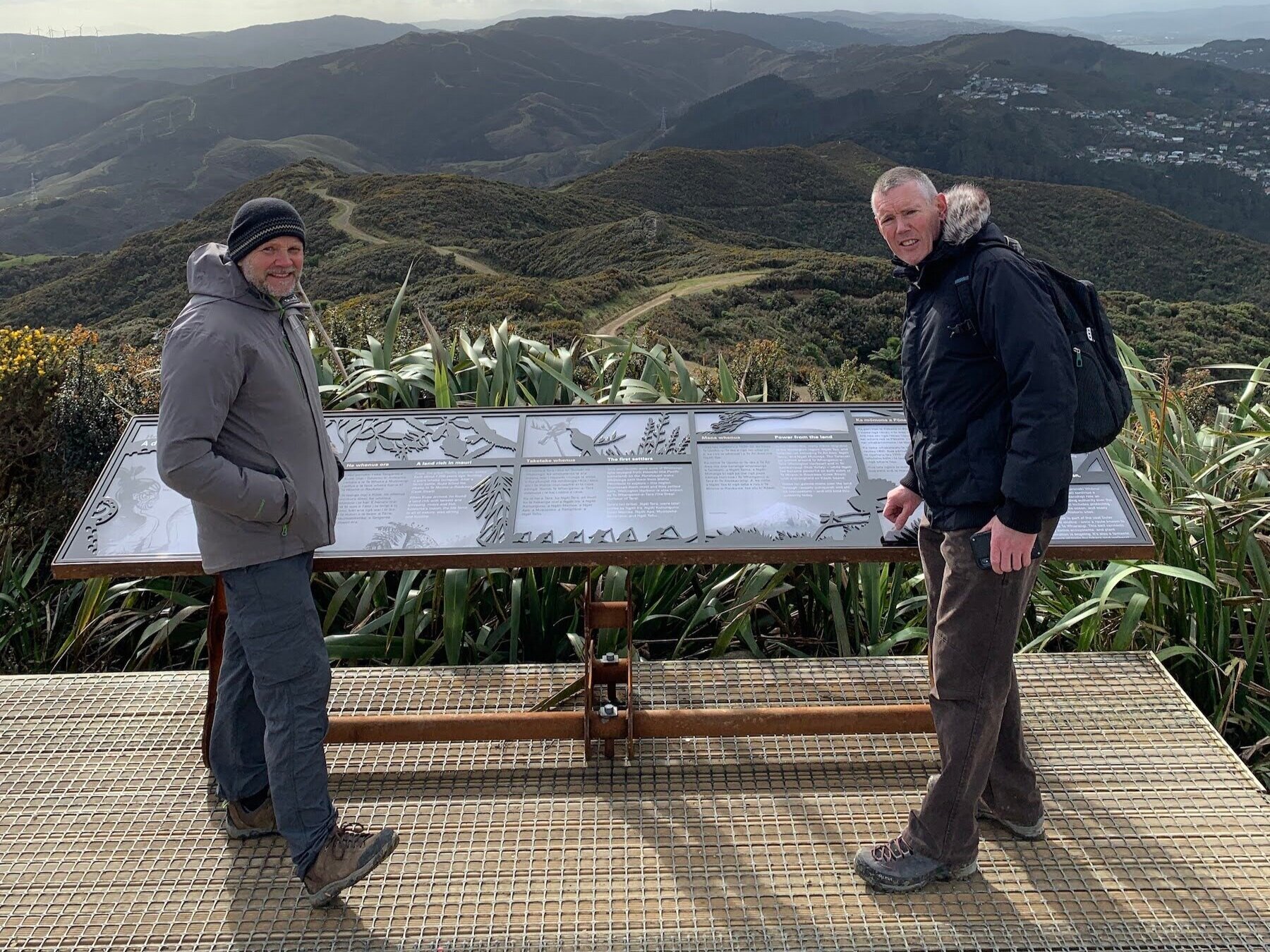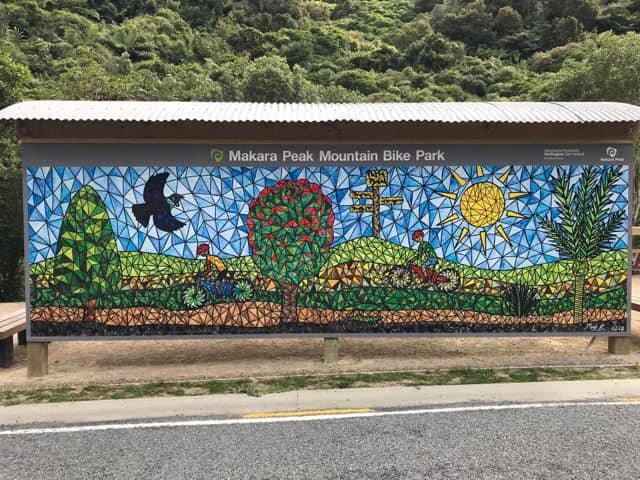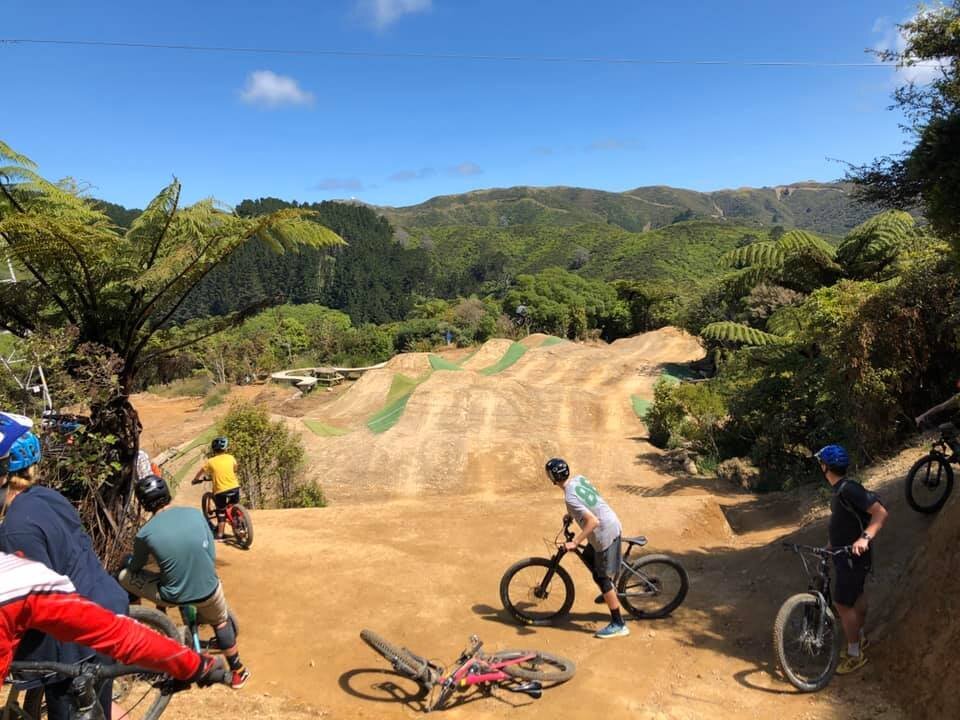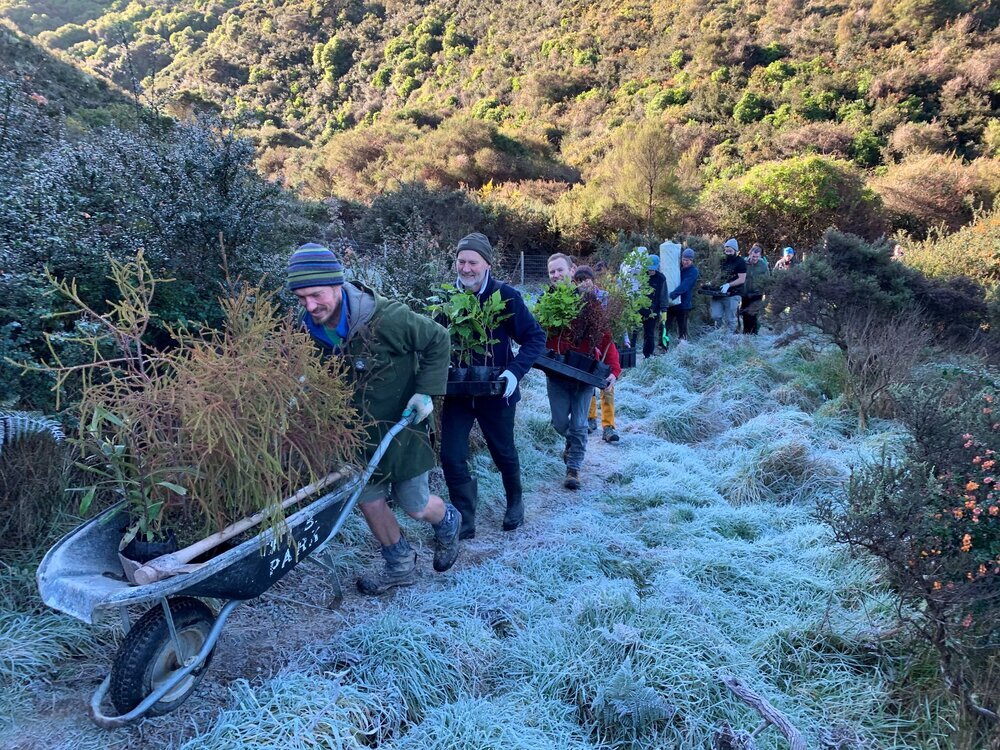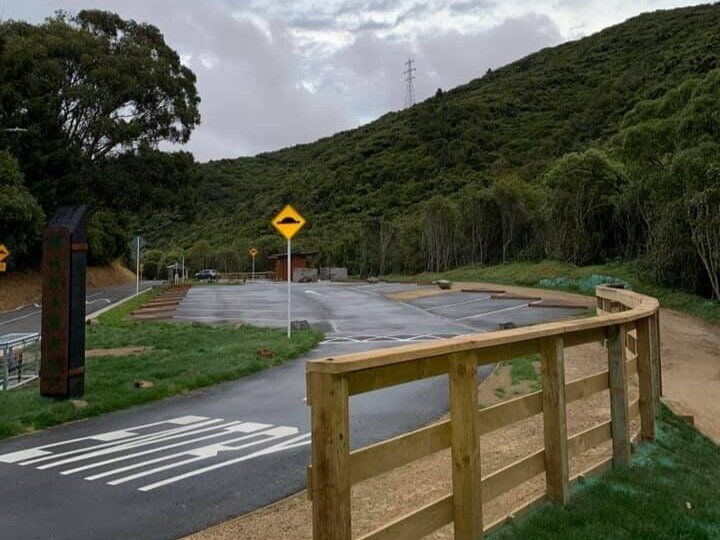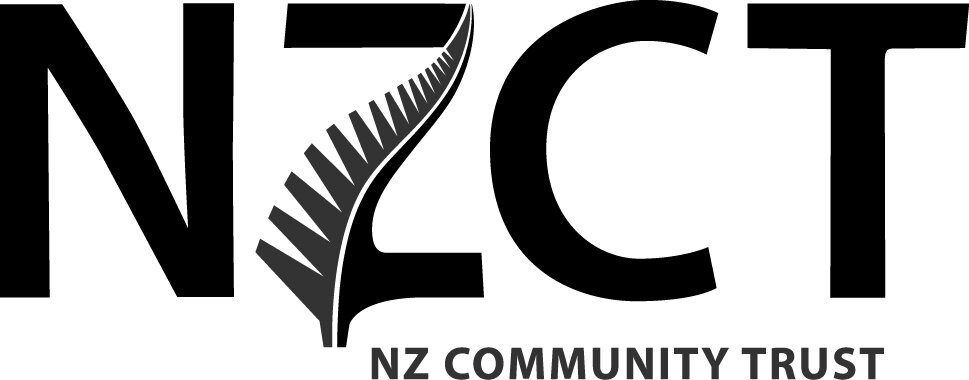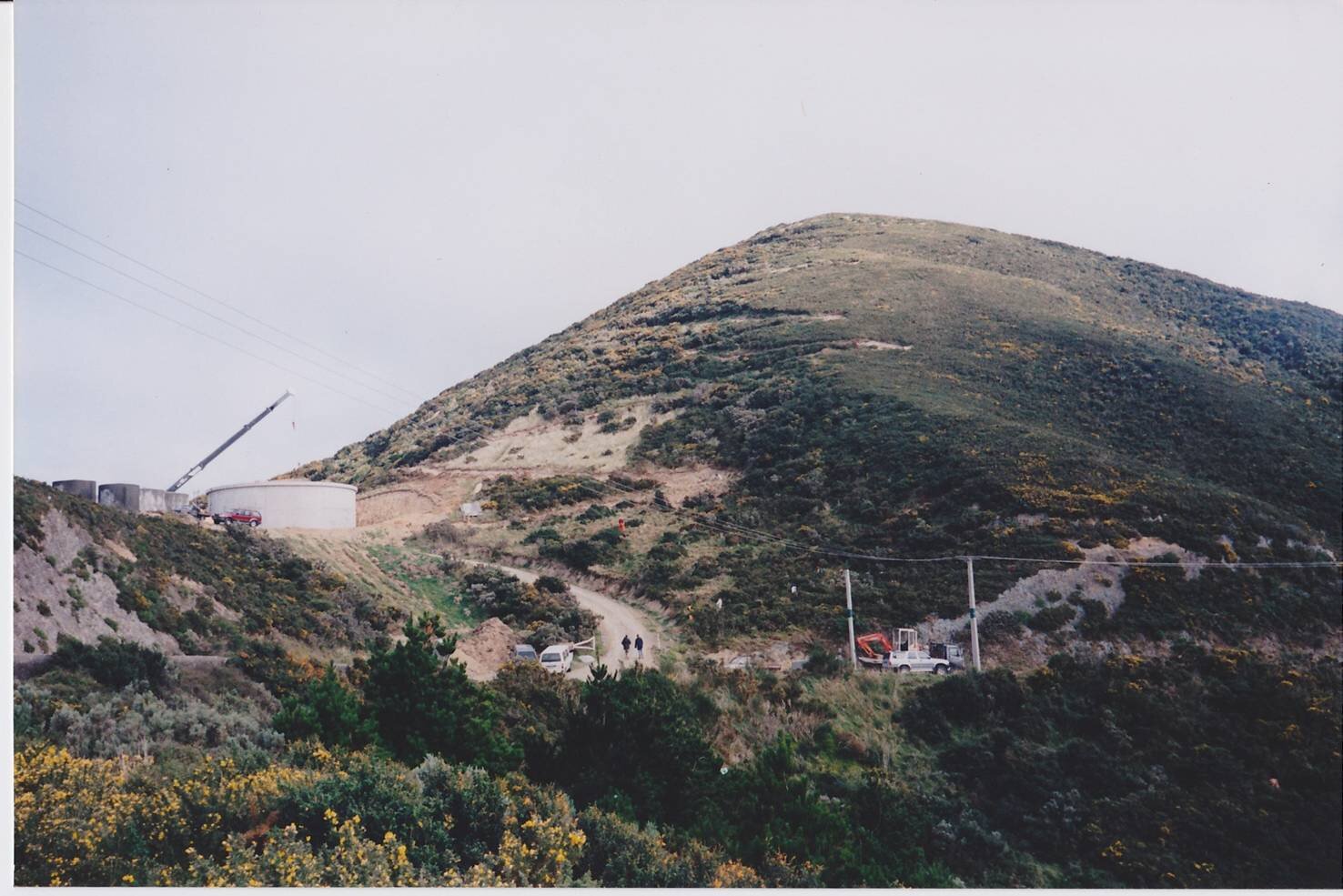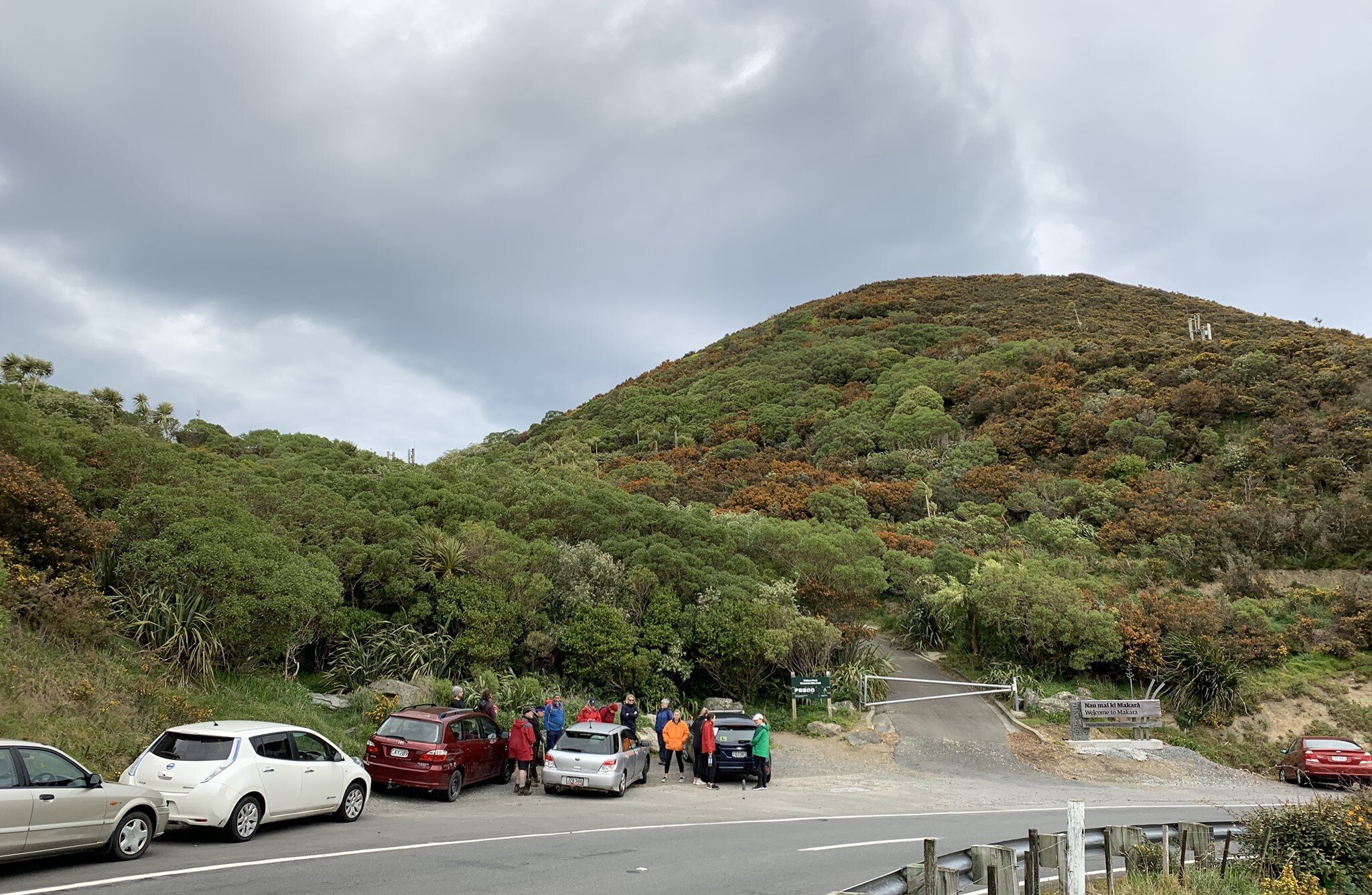Chair’s Report
It’s been another busy 12 months at Mākara Peak Mountain Bike Park with a number of significant and major projects completed. Despite all the achievements, the year will likely be remembered as the one where COVID-19 saw us locked down at home and unable to ride our bikes in the park for the better part of Autumn 2020.
Despite the impact of COVID-19, progress and improvements in the park has continued unabated. A number of major projects were delivered by the Supporters and WCC over the last 12 months, many of which have been in the pipeline for quite some time. Some of my personal highlights include:
The main entrance and carpark on South Karori Road was upgraded and improved by WCC. The changes have made it safer for riders, walkers and drivers, with deeper carparks for safer bike loading, and a clear pathway for everyone to use to get to Koru. The toilet and bike wash facilities are much better and let’s not forget the amazing mural that Miro Kennett designed for us! The project kicked off in August 2019, but prior to that Iain Feist put a huge amount of time and effort into liaising between the Supporters and WCC. With planting and landscaping completed in winter 2020, it was a pretty big job. Now we just need to come up with a solution for the very stylish, but slightly impractical metal bike stands….
On a slightly different scale, but important none-the-less, the entrance on Allington Road was upgraded, with a new concrete ramp, retaining wall and safety rails thanks to a grant from Four Winds Foundation and a bit of our cash reserves. It’s now much more fit-for-purpose for beginners and new riders - my kids find it much easier now when we go for a loop of Miro and Magic Carpet.
To mark the park's 21st birthday, our new summit information panels were blessed and unveiled by representatives from Ngāti Toa, The Mākara Peak Supporters and Mayor Andy Foster. The panels give an insight into the hard work that volunteers have put into the park over the last 20 years. They reflect the history of the park, the surrounding landscape and people’s connection to the land. I’m sure you’ll learn a thing or two when you get the chance to see these at the summit. Thanks to Mark Kent from the Supporters Management Committee who was the driving force behind this project, which has been two years in the making.
The skills area received a long-overdue facelift. I worked closely with WCC and Southstar on the project, with the resulting transformation turning the skills area from an underused and barren corner of the park, into a popular and busy destination for riders of all abilities. I still need to do a lot of work on my jumping skills! This work has been completed thanks to grants from Karori Brooklyn Community Charitable Trust, New Zealand Community Trust and Teriwhiti Charitable Trust, plus 238 people who dug deep into their pockets to donate over $18k to the project. The Supporters made a sizeable contribution from our cash reserves to get the project over the line.
Kohanga o Porokapa: during winter 2020 a hardy group of passionate volunteers have been toiling away in the southern end of the park working to establish a podocarp nursery. The Kohanga o Porokapa project has planted hundreds of seedlings, built access tracks and a pig/pest proof fence has started to be erected. The project is funded by WCC's Natural Environment Fund, MPI's Billion Trees Fund, and the Supporters cash reserves and will help populate the park with massive podocarps over the next couple of hundred of years (!).
The increasing popularity of mountain biking
The number of people using the park has increased steadily over the last few years, with the counters installed at all the park entrances tracking record numbers of people visiting following the COVID-19 lockdown.
The increasing popularity of the park, and mountain biking in general, presents a number of challenges around how to ensure the park stays in tip-top shape throughout the year. This isn’t a challenge that’s unique to Mākara Peak, but the wider trail network across the region.
With that in mind, we’ve been working with Wellington City Council to prioritise regular track maintenance which has dropped off the radar a bit recently. With so many people riding in the park it doesn’t take much for something to go from slightly worn, to an utter mess over the course of a few wet weekends. We all love a new trail as much as the next rider, but we also think it’s important to keep what we’ve got up to standard.
I’d like to offer a massive thanks to the Drury Family, who are making a $50,000 dollar donation for the next three years. We’ll be using this to fast-forward some of the maintenance projects we’ve been wanting to do for a while. Peak Flow is currerntly getting a full top-to-bottom re-work by the TGL team. We’ll then look to continue down the hill, fixing and improving trails that in many cases haven’t seen any major attention or improvements since they were originally built.
Thanks
While the larger projects in the park get a lot of the coverage, I’d like to say a personal thanks to the dedicated group of volunteers who give up their own time to look after the mind boggling number of jobs that go into helping run a mountain bike park. A lot of it goes unnoticed, but it is very much appreciated. So thank you one and all.
We continue to have a great partnership with Wellington City Council, thanks in particular to Ranger Adam Groenewegen, Tim Harkness, Illona Keenan, Anita Benbrook, and David Halliday. Thanks also to our contractors who continue to deliver great work on our behalf - TGL Construction, Jon Rosemergy, Trail Pro, Southstar Trails, Kaitiaki.
Personally, I’d like to say a massive thanks to the 2019/20 Management Committee. It’s been a pleasure working with them all, with plenty of laughs and banter had at our monthly meetings. With a huge amount of passion for the park, it’s a credit to everyone that we all manage to work well together in such a constructive way.
2019/20 Management Committee: Clint Brandon, Andrew Cooper (Secretary), Stewart Glynn (Treasurer), Simon Kennett, Mark Kent (Tracks Lead), Evan McCarney, Peter Leman (Conservation Lead), Kerei Thompson.
Tracks sub-committee: Mark Kent (Lead), Clint Brandon, Andrew Cooper, Iain Feist, Simon Kennett, Scott Newman, Simon O’Brien, Ricky Pincott, Kerei Thompson.
Conservation sub-committee: Peter Leman (Lead), Simon Kennett, Evan McCarney, Andrew McLellan.
Trapping and bait line team: Janet and Martin Toland, Evan McCarney, Andrew McLellan, Dave Rudge, Mike Pratt, Euan Galloway, Sarah Bramwell, Andy Foster, Kirsten Haupt, Simon Greenway, Anna Grant, Nick Kalasih, Dave Nendick, Peter Leman, Clare Odell, Kim Tottenham, Gareth Alley, Ellen Mary Pullar, Jon Lyall, Gillian McIlraith, Matt Dwyer, Sam Eccles, Liz Hooks, Peter Williams, Ligs Hoffman, Karen Evans, Andrew Wade, Anton Marsden, Ian McIlraith, Angie Hughes, Shannon Wilson, Sid Jones, Florence Liger, Liz Smit.
Pedal on
Simon O’Brien
Chair
Mākara Peak Supporters 2019-20
Treasurer’s Report
2019/20 was a hugely successful year for Mākara Peak in terms of income. Total income was over $154k, up from $55k in 2018/19 – an increase of 180%. The increase was down to some amazing work from the fundraising team who raised almost $58k (more than double the amount for the previous year), and a fantastic donation of $50k from the Drury Family.
We also had continued sponsorship from Wellington International Airport Ltd for the Wild At Heart suspension bridge ($10k).
We applied for and received grants for the following projects. Without this support, these projects would not have been possible.
$10,000 from the Lion Foundation towards the skills area project
$15,420 from New Zealand Community Trust towards the skills area project
$4,000 from the Four Winds Foundation towards upgrading the Allington Road entrance to Rimu Track
$1,000 from the Terawhiti Charitable Trust towards the skills area project
$10,000 from Wellington City Council towards the Lizard Survey
$2,000 from the Wellington Zoo Trust towards the Kohanga Project
$15,000 from the Ian “Zac” Pearson Memorial Fund, managed by the Nikau Foundation, for work on and around Zacs track
Thanks to the 238 people who donated over $18,000 towards the skills park project via our givealittle campaign, and to our members whose individual and family subscriptions contributed $8k. Other grants have also been received for the Kohanga project.
Passing the $60k threshold for GST registration required us to re-register for GST during the year, which will result in a healthy GST refund.
Expenditure
The substantial increase in income enabled the Supporters to invest heavily in upgrading the park. Total expenditure for the year was almost $103k, more than double expenditure from 2018/19 ($51k). Over half of our expenditure ($53k) went on upgrading the skills area. $26k was spent on Zacs track – $14k on fencing and planting, and $12k on track maintenance. Other substantial areas of investment were the Rimu entrance upgrade ($6k) and the start of spending on the Kohanga project ($4k). Depreciation of assets charged during the year amounted to $4k.
Overall
The Supporters made a net profit of over $51k during the year, increasing net assets from $104k to almost $156k. This figure is comprised of bank ($100k), term deposits ($40k), fixed assets ($6.5k), and a GST refund due of $9k.
We are in an extremely strong financial position and are well placed to make further substantial improvements to the park during the forthcoming year.
Stewart Glynn
Supporters Treasurer
Thank you volunteers!
The park continues to rely on volunteers to do a huge amount of work. Track building, maintenance, planting, trapping and pest control, signage, the back office stuff no-one sees, applying for grants. The list goes on and on. On behalf of the Supporters, a massive thank you to everyone who has contributed over the last 12 months.
If you’re keen to get involved, check our events page, follow us on Facebook or drop us a line.
Kohanga a porokapa
One of the big projects this year was the establishment of the Kohanga o Porokapa - the Nursery of Podocarps. Our aim was to plant 2,000 seedlings (half of them kahikatea, rimu, totara, miro and matai) in a one hectare area of retired farmland near the bottom of Leaping Lizard. To ensure success, we started off fencing most of the area off to protect the seedlings from feral goats and pigs. By the end of Winter 2020, we had:
a bit over one hectare fenced off against pigs goats sheep and rabbits
1,850 seedlings planted, with 800 of them being podocarps (kahikatea, totara, miro, matai and rimu
seed bank and bird larder of the future
Huge thanks to WCC, MPI Billion Trees Fund, Wellington Zoo, Forest & Bird, BOLT, Greenwood Environment Trust and Trees that Count.
Lizard survey
healthy population of northern grass skinks by 4wd track
anecdotal reports of gecko
further investigation to do including a report from Wildlands and a discussion with WCC's Urban Ecology Team about establishing a more diverse community.
Predator control
865 predators were eradicated over the last 12 months which is great news for the native birds we’re seeing more and more of in the park. Specifically, 452 Rats, 42 Possums (plus countless others poisoned), 39 Hedgehogs, 20 Stoats, 14 Weasels, 287 Mice, 6 Rabbits and 5 unspecified were killed.
There was also some great work done by Trent on feral pigs, goats and sheep. Thanks to WCC for controlling buffer zones around the Park. GWRC took over the bait stations (possum poison) freeing up volunteer time. Special mention to Euan and Jan Galloway and Bronwen Wall who were bait volunteers for 21 years! This all built on some great work by many volunteers in the Park and surrounding areas.
Planting
In addition to the work on the Kohanga project, 550 seedlings planted on Zac’s and T4, and a couple of hundred planted by the car park by Bark Limited (thanks to Kerei Thompson from the committee for coordinating and donating Bark’s time).
The photos of the bottom of Varley’s show the impact of the dedicated planting programme that’s been undertaken around the park over the last 21 years.
Ecological plan
The Ecological Management Plan for the park expired in 2018. Since then, we have collected missing datasets about the ecological state of Mākara Peak. These surveys combined with established data collecting include, bird counts, weeds, lizards, saplings, bats (in adjacent land), predators (chew cards), catch records, and bait take. When this data is combined with our goals, we can better plan strategies to accomplish them. This plan will be created when we meet with the Urban Ecology Team to create short-term plans that will replace the large ecological management plan from 2013. This will become a yearly event to reflect the fast changing ecological landscape within Mākara Peak Mountain Bike Park and the surrounding reserve land.
One key dataset is a weed survey for which we are seeking grant funding.
Conservation sub-committee
We had another great year of volunteering ranging from newcomers from out of the usual catchment to some who have been giving up their time from day one, 21 years ago. A real treat for volunteers was a guided walk around the Wainuiomata water catchment and special thanks to WCC Ranger Adam Groenewegen and GWRC Ranger Ricky Clarkson. We saw some stunning old growth forest and matai trees more than a millennium old.
Peter Leman
Conservation Lead, on behalf of the Conservation Sub-committee
In February the park hosted a round of Wellington Mountain Bike Club's annual Wellington Enduro Series. The Judith Collins Crusher-Duro had warm weather, negligible wind, the trails were in prime condition and the new carpark had just been opened.
Entrants had to post a time on either 3 or 5 stages, for the easy and hard categories respectively. The trails included classic old school lines like Lower Leaping Lizard and Vertigo, as well as some of the newer tracks in the park such as the new SWIGG and Starfish. As the stages could be finished in any order the park showed a sponge-like ability to absorb over 200 riders with minimal queuing throughout the day, and marshals wondering just where everyone was.
Timing was taken care of with WMTBC's chip and transceiver system, giving all riders their stage times as soon as they finished, and overall results as soon as the last rider arrived. In the end Jessie Cseh would take the Men's overall by just two seconds over Eden Cruise, while Khulan Tumen stamped her authority over the female classes. Competitors spoke very highly of the tracks, from old hands to out-of-towners experiencing the park for the first time.
Thanks to Aidan Forrest and Tom Adams from WMTBC for putting on a very slick and well run event. More than $4000 was donated back to the park from the entry fees!
Thanks to Dan Sharpe/Visualsbyme for the photos.
In 2020-21 in addition to the Wellington Enduro Series event, we’re looking to run a few more events in the park. Look for the return of the Creek to Peak in early Summer, and our take on a family-friendly enduro later in Summer. Keep an eye on Facebook and the website for more information.
Tracks report
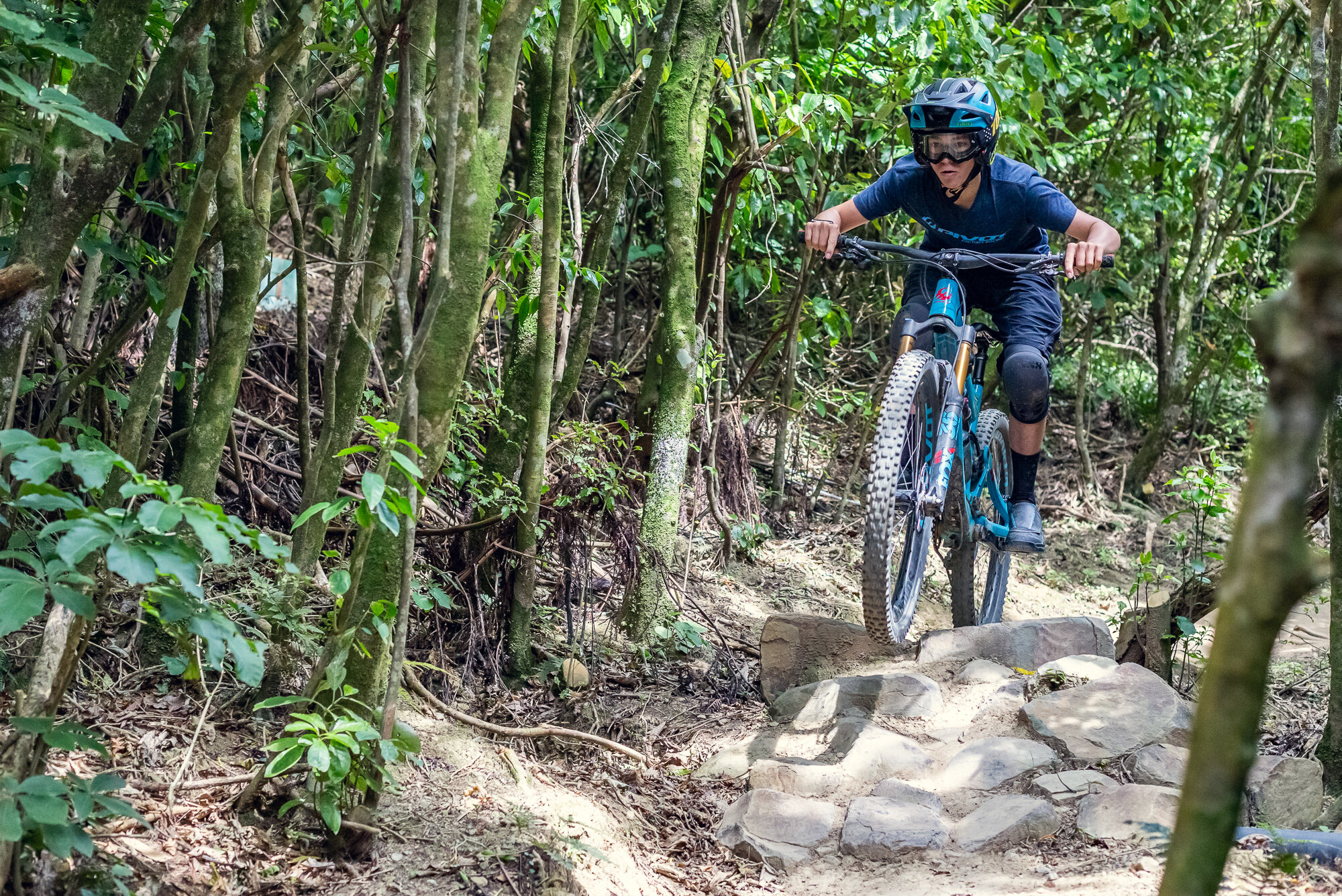
It’s been another fantastic and successful year for Mākara Peak trail network, with a combination of funding from the WCC, fundraising, community grants, donations and judicious use of our cash reserves enabling the trail network to grow as we continue to implement the Park’s master plan.
Expansion of the network is important to help ensure the success of the park. Rider usage has increased, on a fine Saturday or Sunday in the middle of summer seeing on average 800 riders per day, which is just amazing.
One of the success stories over the last 12 months has been the upgrading of the skills area. It’s now a great asset for the park and enables riders of all abilities to safely hone their skills before tackling the more challenging trails that Mākara Peak has on offer. Big thanks to Simon O’Brien for leading the charge on this project.
Photo credit: Caleb Smith
The Mākara Peak Supporters committee and volunteers have continued their weekend ritual of trail building throughout the year. The focus in 2020 has been on the grade 4 North Face extension, which links the bottom of North Face to Starfish and will complete the grade 4 descent from the summit to the main carpark. This is shaping up as another awesome piece of singletrack in the same style as Starfish with lots of features and optional lines to keep riders interested. A lot of mahi has gone in to this trail despite the six week pause during lockdown. During the lockdown we did our part and stayed out of the park and well done for those who also resisted the urge to dig and ride.
There has been a huge increase in volunteer numbers thanks to the shift to late Sunday afternoon work parties. They have become a real social occasion complemented by the infamous beer and sausages at the end of 2 hours on a grubber. Corporate groups have been lent a hand as well - a big thanks to New Zealand Post, Westpac and the Western Builders, for committing their time to the park.
The park has seen the construction of the new T4 (Trail To The Top) climbing trail which has replaced the old T3 trail. While it was a tough decision to repurpose T3, ultimately that sector of the park gets a lot more use out of the new configuration and opens it up to a whole lot more users. This has been complimented by the upgrade of Zac’s track which has created another one of those fantastic loops from the summit.
A short new section of singletrack was built by Trail Pro which links the summit to the start of North Face and Trickle Falls. It’s great to see the 10 year plan getting closer to completion thanks to all of this hard work. These new trails are really going to open up the myriad of options for a day of riding on Mākara Peak.
Winter hasn’t been so kind to Mākara Peaks trails this year. Rain seems to have been heavier, if less frequent this winter which has added to maintenance, which the council have been getting on top of with the help of contractors. A large section of Sally Alley disappeared into the valley after one of the deluges during lockdown. The WCC are working on options to either reinstate the section of trail or to re-route the trail above the old section, this is a work in progress so please stay tuned.
So how can you help with maintenance? When it’s been raining before you jump on your steed just to give a thought for the tracks and give them a little bit of time to dry out before you head for the hills.
What’s coming up
For the next 12 months our efforts are going to be focussed on:
finishing off North Face extension
under the watchful eye of Scott Newman who was the driving force behind Yeah Gnar, we’re building a bypass around the massive and unsustainable ruts on Vertigo and looking at some tweaks to make a couple of sections of Trickle Falls more interesting
tweaking the bottom of Starfish. We’d like to bypass the pinch climb at the bottom, and make some other changes to continue to improve it.
Possibly a new bit of track linking the high point on Magic Carpet into the top of Live Wires to bypass the skills area.
After that, the master plan projects which will be led by volunteers and/or contractors over the coming few years include:
Maintenance, maintenance, maintenance - The Drury Family’s annual donation will be used to improve some of the existing trails that need some love and attention. Once Peak Flow is complete, we’ll look to do some work on Three Brothers Part 3, Smokin and the top of SWIGG to make sure the main grade 3 descent is truly world class. And ideally we’d do a complete top-to-bottom rework of Lazy Fern.
Sally Alley - rebuild and re-open the end of Sally Alley after the lockdown slip.
T4 extension - a new grade 3 climb from the water tower at the bottom of Varley’s to connect into the bottom of T4. This is really going to open up the north west end and give riders an alternative entrance into the park.
New Grade 4 descent - from the top of T4, down to Vertigo and then on to the water tank at the bottom of Varley’s. This is designed to replace the old T3, but we’re not sure what style of track it will be.
Zac’s extension / Varley’s remedial work - extend Zac’s track on the left hand side of the ridge down to the third or fifth switchback on Varley’s to create one continuous grade 3 decent from the summit to Mākara Road. Work will be done on the bottom half of Varley’s to improve drainage, berms and and trail surface.
North Face direct - A new section of genuine grade 4 that will branch off North Face before that pesky climb and rejoin North Face at the last switchback. This will be a volunteers build. Eventually we’d also like to build a new grade 4/5 line from North Face down into Trickle Falls valley but that might be a few years off.
Live Wires / new main entrance climb - we’ve got agreement in principle from WCC around the alignment for the proposed new grade 3/4 climbing trail from the main entrance on South Karori Road. The Tracks subcommittee have been working on alternative options to avoid losing Live Wires since this contentious proposal was first consulted on and approved a few years ago. Our preferred alignment will split off from Koru Shortcut and climb up and eventually cross, but not utilise any of the existing Live Wires track. It will then continue up the hill and finish near the Koru/Lazy Fern junction. There aren’t any firm plans on when this project will kick off, with the focus currently on the northern end of the park.
Thanks again for all the hard work that the volunteers and the supporters committee have put into the park over the last 12 months. The support from the WCC, sponsors, members and donors such as the Drury Family have been fantastic and helped immensely with the development of the trail next work. I’m looking forward to seeing what we can achieve over the next 12 months.
Nga mihi
Mark Kent,
Tracks lead, on behalf of the Tracks Subcommittee
